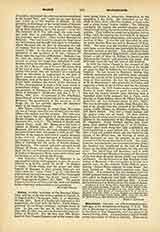
Alfred-Henri-Amand Mame
Printer and publisher, b. at Tours, Aug. 17, 1811; d. at Tours, April 12, 1893

Mame, ALFRED-HENRI-AMAND, printer and publisher, b. at Tours, August 17, 1811; d. at Tours, April 12, 1893.
The founder of the Mame firm, Charles Mame, printed two newspapers at Angers in the last quarter of the eighteenth century; General Hoche had at one time hoped to marry his daughter. His eldest son, bookseller and publisher in Paris, under the First Empire, edited Chateaubriand’s famous opuscule, “Buonaparte et les Bourbons”, also Madame de Stael’s works; and the persecutions directed against these books by the Napoleonic police caused the financial ruin of the editor. But the third son, Amand Mame, came to Tours and founded there a firm which, under the management of Alfred Mame, son of Amand, was destined to become very important. After having edited, together with his cousin Ernest Mame, from 1833 to 1845, some classics and a few devotional books, Alfred conceived and carried out, for the first time, the idea of uniting in the same publishing house, a certain number of workshops, grouping all the industries connected with the making of books: printing, binding, selling, and forwarding. By analogy with the great iron works of Le Creusot, the Mame firm has been called the literary “Creusot”. Mame was also one of the principal owners of the paper-mills of La Haye-Descartes; and it could thus be said that a book, from the time when the rags are transformed into paper up to the moment when the final binding is put on, passed through a succession of workers, all of whom were connected with Maine. Daily, as early as 1855, this interesting and enterprising publishing-house brought out from three to four thousand kilograms of books; it employed seven hundred workers within and from four hundred to five hundred outside. While it put into circulation numberless books of devotion, it was also publishing the “Bibliotheque de la jeunesse chretienne”, a rich series of books destined for prize distributions, the religious tone of which was guaranteed by an express approval given by the Archbishop of Tours. On the other hand, the Alfred Marne Press issued splendid publications: “La Touraine”, exhibited at the Universal Exhibition of 1855, which was in its day the finest of illustrated books; the “Bible” with illustrations from Gustave Dore; Vetault’s “Charlemagne“; Wallon’s “St. Louis”; the authoritative collection of “Chefs d’oeuvres de la langue francaise”. Quantin, the publisher, calculated that, in 1883, the Marne publishing-house issued yearly six million volumes, of which three million were bound.
Inspired by the social Catholic ideal, Alfred Mame established for his employees a pension fund which allowed an income of six hundred francs to those over sixty years, and this fund was wholly maintained by the head of the firm. He opened schools for the laboring classes, which caused him to receive one of the ten thousand franc awards reserved for the “etablissements modeles oil regnaient au plus haut degre l’harmonie sociale et le bien-etre des ouvriers”. During the Vatican Council at Rome, Bishop Ketteler, meeting Alfred Mame at Spithoever’s library, interviewed him earnestly on his philanthropic efforts for the benefit of the working-men of Tours. In 1874 Mame organized a system by which his working-men shared in the profits of the firm. His dying words were recalled by Cardinal Meignan, Archbishop of Tours, in his funeral oration: “My consolation is that I never published a single line that might grieve religion and virtue.” At one time he tried but unsuccessfully to enter political life; at the election of October 14, 1877, he presented himself in the first district of Tours as candidate for the Chamber of Deputies, on the conservative side, against Belle, the republican deputy who had founded in Tours the first lay school for girls. Mame was defeated, having 7456 votes, against 12,006 obtained by Belle.
PAUL MAME (1833-1903), a son of Alfred, was the head of the firm until 1900.
GEORGES GOYAU

